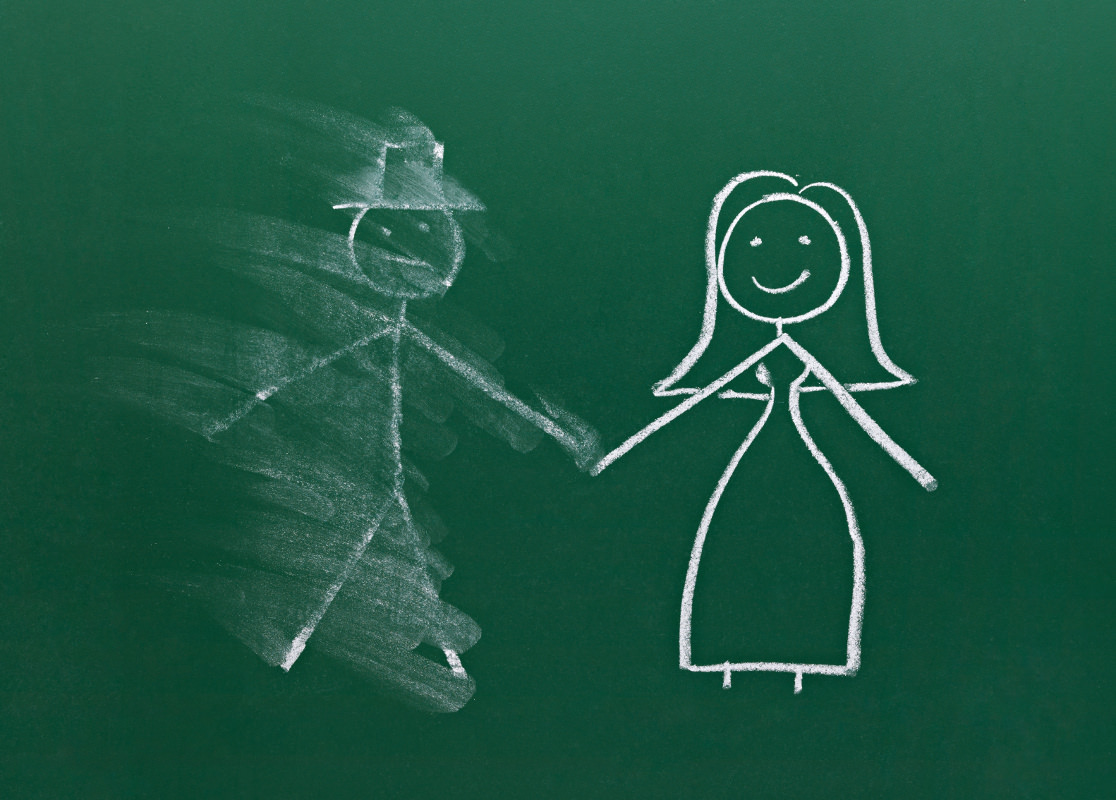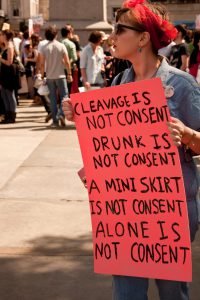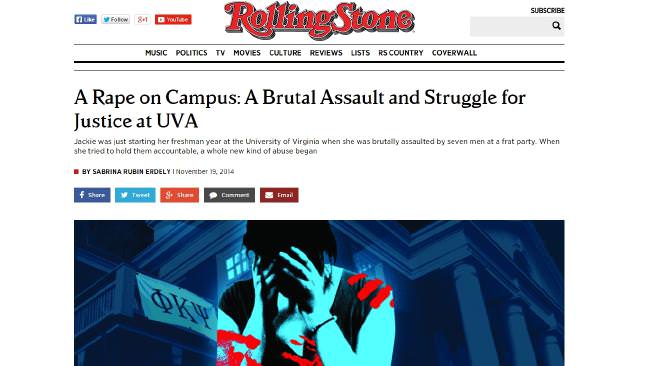Art and Culture
Laura Kipnis, Rape Culture, and the Disappearance of Sex
The net effect is a chilling of casual sexual interactions, especially amongst young people. And so, why is anyone surprised? And why doesn’t the media want to talk about it?

Earlier this month, Harper Collins released Northwestern professor Laura Kipnis’ book Unwanted Advances, based on her article about the accusations and subsequent resignation of fellow professor Peter Ludlow for alleged sexual misconduct with a student. Kipnis characterizes the investigation as an “inquisition,” and draws doubt on the “credibility of the accuser’s claims and the fairness of the process”. I won’t go into the further details of the actual case, but what makes Unwanted Advances especially relevant is its broader examination of the “rape culture” hysteria on college campuses, a claim that asserts that fully 25% of women will be victims of sexual assault while in college.
A number of critics have dissected the flawed methodology on which this astronomical number is based, and noted that if true, it would mean that American college campuses are as, if not more dangerous than cultures that truly turn a blind eye to rape, such as Afghanistan or the Congo, where 48 women are raped every hour. I think most casual observers would have to be at least somewhat skeptical about the veracity of these claims; if actually true, would any parent with common-sense send their daughters to any institution in which she has a one-in-four chance of being raped? Indeed, one major news outlet declared colleges to be “one of the most dangerous place for women in America.”

As the saying goes, extraordinary claims require extraordinary evidence. Yet despite numerous concerns about the data, this same statistic used to prop up rape culture assertions is passed around as absolute truth in academia, without the slightest whiff of self-awareness and with complete credulity. The last time I was at an academic conference, the words “rape culture” were bandied about as if they were gospel and everyone in attendance accepted them as unquestioning truth. Either everyone believed or was too afraid to speak out.
Anytime some idea or statistic that makes no sense is heavily promoted, and it is even doubtful if the believers even believe it (again, why would anyone in the world go anywhere where there is a 25% chance of being raped?), you have to wonder who stands to benefit from such mythology. And here is where the plot thickens. A recent study in the prestigious Archives of Sexual Behavior last month has garnered significant media attention due to the bombshell revelations that Americans are having less sex than ever. Specifically, and most surprisingly, the Millennial generation appears to be having less sex than anyone, despite all the benefits that technology affords in finding casual sex. This was not the first time that research found similar results. Indeed, another study published in summer of 2016 came to the same conclusion: Millennials, despite all hype to the contrary, were the most prudish generation in a century.
However, as an NYC- based psychotherapist specializing in sexuality issues, I was not too surprised. The stories and concerns I hear from my clients do not necessarily match up with the narratives promoted by mainstream media. I’ll get to that in a moment, but to me, these news items most powerfully brought to sharp relief the wide disparity between media representations and the true, real-life stories I am privileged to hear in my office.

I am often called upon by the media to provide my commentary and opinions when a note-worthy sex issue hits the news, and this was no exception. I had a camera crew come to my office in August and recorded me for over an hour. In March, Reuters reached out to me about the most recent study and my quotes were picked up by numerous other media sources. The camera crew wanted me to identify some reasons why I thought Millennials might be choosing to have less sex. I immediately thought of my clients, three young men who each separately had told me earlier in the year that they were terrified of casually hooking up due to fears of false rape accusations and confusion regarding policies such as affirmative consent.
From the reactions of the crew, I could tell right away that I was telling them something they didn’t want to hear. They all looked at each other anxiously and the producer continuously tried to steer me away from the perspective I was sharing of my clients’ experiences and onto some vague narrative about technology, video games, and porn. But unfortunately, the lived experiences of my clients don’t necessarily easily match up with forced narratives created in some media news room.
One of my clients shared with me that he did spend more time playing video games, but that was more due to trying to avoid unnecessary “dangerous” (in his words) interactions with women. And what was so dangerous, according to him? He believed that the current climate on his campus was so toxic between the sexes, that he was already suspiciously viewed as a potential predator, and so he didn’t stand a chance to have a fair shot if things turned sour and a false accusation was leveled upon him. In other words, he felt disempowered, and fully responsible for anything that happened, including the choices of his partner, ranging from the amount of alcohol she decided to drink to whether she later decided to change her mind, even after the fact. Video games or porn weren’t preferable, they were safer. Obviously, most women would never imagine making such unsubstantiated accusations, but as my clients believed, why even take the risk?
When the video was released online, all comments I had made about the effects of rape culture hysteria on actual hookups were removed, and instead it appeared like I was mindlessly chiming in with all the experts about all the horrible dangers of being “addicted” to Facebook likes. No substantive discussion about the real worries and concerns that young people actually have about hooking up. Only bewildered head shakes about why on earth young people would not want to socialize with their peers in real life. Must be the technology. Rape culture hysteria, well that’s only something actual rapists would be concerned about. Any large-scale trend typically has many contributing factors, so I’m not advocating for a reductionist position, but why not include these concerns as part of the discussion?
Same thing happened in the Reuters article. The journalist seemingly covered every angle (including blaming marriage) except for the actual real-life experiences of Millennials, which I was more than happy to share. But, once again, the media just wasn’t interested. There have been a number of high-profile cases of false rape accusations, from the Rolling Stone UVA rape hoax story to the fraudulent Duke lacrosse rape accusations. Every alleged rape case should be taken seriously, and every effort should be made to create a safe society, one in which laws are enforced and criminals are brought to justice. But, with the current climate of affirmative consent and “listen and believe,” is it possible that all sexual risk is now completely shifted onto men?

“A Rape on Campus” is a now-retracted Rolling Stone magazine article, written by Sabrina Erdely and originally published on November 19, 2014, that claimed to describe a group sexual assault at the University of Virginia (UVA). Rolling Stone retracted the story in its entirety on April 5, 2015.
Rape is abhorrent, a traumatic violation of selfhood, and I can understand that initiatives such as affirmative consent and listen and believe come from a good place of desiring to protect women. As a society, we obviously want women to feel empowered to assert their desires, to not feel pressured if they do change their mind, and to have a fair platform to voice grievances. But every action has both intended and unintended consequences. Rape is a very serious accusation, one that ruins lives. By conflating regrets with sexual violence, and treating the punishment for regretful sex the same as the punishment for sexual violence, the net effect is a chilling of casual sexual interactions, especially amongst young people. And so, why is anyone surprised? And why doesn’t the media want to talk about it? I have some thoughts below. They are mere hypotheses, but I welcome a robust conversation on their merits.
At one level of analysis, sexuality is all about power. A more thorough exploration of this is beyond the scope of this essay, but think about how many behaviors in life are driven by the pursuit and desire for sex and sexual currency. And the rape culture hysteria perhaps clearly brings to sharp relief the ultimate aims of third-wave feminism. While first and second wave feminists were primarily concerned with equality, I do wonder if power is the primary objective of (at least some) third-wave feminists, not so much the students but the thought-leaders and activists that set and create the platform. Power doesn’t exist in a vacuum, and I would argue that it is never absent. But true equality is not about the absence of power, but rather the sharing of power. Third-wave feminism, as evidenced by the relentless promotion of rape culture discourse, and turning a blind eye to its repercussions, isn’t really aiming for shared power, but rather a monopoly on power—sexual power, to be specific. And in the case of gender relations, sexual power allows for the dictation of all gender relations.
In the current climate of political correctness, an honest conversation around sexual power is probably too unrealistic. But, it’s a necessary discussion. Is it any wonder that individuals who feel disempowered decide to tune out, rather than play on a rigged field? If we are going to make sex great again, something that Millennials actually want to do, we are going to need to create a culture of empowerment rather than fear, one where both discourse and policies incentivize participation through an acknowledgment and cultivation of shared responsibility, equal stakes, and balance of power. Now that would be hot.






